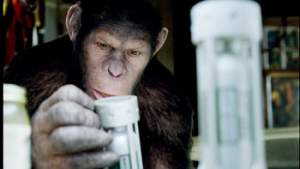
The idea that human evolution was superseded by what had previously been considered the lower primates may have seemed a little farfetched to cinema audiences of the late '60s, but maybe not to anyone watching the television news over the last few days as marauding gangs of youths went around smashing and looting their own neighbourhoods. There are clearly large pockets of English society that have completely escaped evolution.
However, in this new prequel, it wasn’t the humans that were devolving, but the other primates that were evolving, all thanks to the wonders of science. A new, experimental drug, devised as a cure for Alzheimer’s, is tested on chimpanzees, causing their intelligence and cognitive skills to dramatically improve.
When one of the experiments goes wrong, the research is shut down but the head of the team, brilliant young scientist Will Rodman (James Franco), smuggles out a baby chimp and takes it home to raise it, where he discovers that it is way smarter than the average monkey. It’s not long before the human and chimpanzee aspects of Caesar, as he was named, come into conflict, along with his relationship with his adopted family, which lead to Caesar being caged with a lot of other primates. And so it begins.

This is already a great sci-fi action movie in its own right, addressing the relationship between man and his closest primate cousins, that shines a not too flattering light on our development as social creatures. It is even more chilling if you see another movie also out this week, called Project Nim by Oscar-winning documentary maker James Marsh. This doc follows the story of a young chimp, taken from its mother at a young age and placed in a family situation where it is raised as if it is human and taught to communicate with sign language. It is soon passed from one “owner” or carer to another until its human and chimpanzee aspects come into conflict, along with his relationship with his adopted family, which lead to him being caged with a lot of other primates.
Essentially we have the same basic story, set in the same era, except one is true and the other is a “what-if” extrapolation of the scenario. I highly recommend seeing both films, the order in which you see them is not that important because the similarities will still be powerfully striking.
Rise of the Planet of the Apes and Project Nim are in cinemas now.
See Planet of the Apes at Apollo Piccadilly and get 30% off your ticket at the box office or by phone on 020 7451 9944 and quoting the code SCI FI offer.